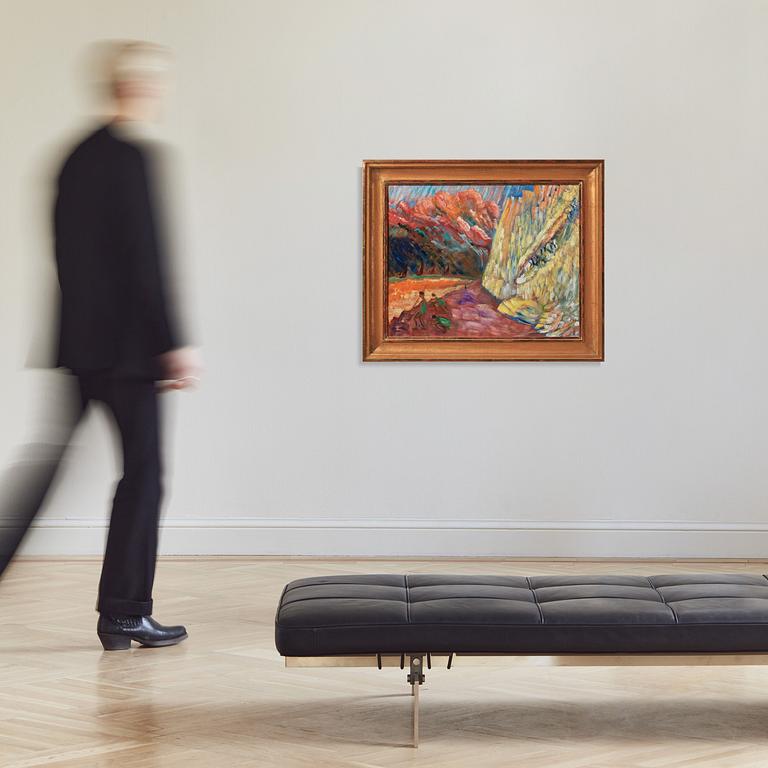Sigrid Hjertén
"Kalkklippan, St Aubin" (The limestone cliff, St Aubin)
Signed Hjertén. Executed in 1935. Canvas 73 x 92 cm. The painting has also been called "Oväder, Saint Aubin" (Stormy weather, Saint Aubin)
Näyttelyt
Moderna museet, Stockholm, "Sigrid Hjertén 1885-1948", 1964, cat. no. 48 (wrongly dated in the catalogue).
Kirjallisuus
Moderna museet, Stockholm, "Sigrid Hjertén 1885-1948", 1964, reproduced full page (wrongly dated in the catalogue).
Carl Palme, "Sigrid Hjertén", Stockholm, 1936, reproduced page 11 (wrongly described and dated in the catalogue).
Muut tiedot
In 1920 the Hjertén/Grünewald family had returned to the French capital after almost ten years in Sweden. Sigrid Hjertén sought out new motifs outside the city, partly to get away from the noise of the city but also to get inspiration from rural life and the dramatic scenery in the coastal areas. Following a decade of portraits of family members and above all of the son Iván, portraits of people are now becoming increasingly rare. The surroundings are allowed to take up more space on the canvas, evident in paintings of the city and landscapes. In 1921, Sigrid Hjertén paints the first version of the dramatic rocky coast at Saint-Aubin-sur-Mer, in Normandy. She would return to this motif later in life.
At this time, Hjertén's mental disease becomes increasingly noticeable. In 1932 she seeks treatment back in Sweden and the paintings that were created in the following years bear an expressive painterly strength, where the color itself has taken over the main role from possible models and views. In 1934 the family makes a trip through Europe to Sicily. Back in Sweden, Hjertén work is focused on reinterpreting motifs from memory going back to the 1910s. Powerful and picturesque variations of the view of lifting cranes on Stadsgårdskajen are created. She also travels in time back to the years in France. Carl Palme writes in his book on the artist about the "cold yellow color" that was always present in Hjertén's palette. This color becomes particularly significant during Hjertén's last active years as an artist and it is extremely noticeable in the painting in this auction, "The limestone cliff, St Aubin" from around 1935.
"The limestone cliff, St Aubin" is an excellent example of the artist's 1930s painting at its best. What could possibly be perceived as restrained in the early version of the large limestone cliff from 1921, literally explodes in color and form treatment in the current painting. The artist has worked with broad and fast brushstrokes and sharp diagonals which raise the temperature and intensity of the composition. Hjertén has used the "cold" yellow color to bring out the light limestone rock, which stands in sharp contrast to the warm red tones of the beach where three figures in green swimwear appear. A storm looms over the horizon and the sailboats seem small and vulnerable, their sails taking on the black-red hue of the stormy sky. A couple walks along the beach, she in a bright red dress and he in black. The painting was most likely done in 1935. Hjertén then had a makeshift studio in the couple's apartment, and here, after returning from the trip to Italy, these almost impressionistic commemorative pictures were added. Knowing that Hjertén put her palette and brushes away for good only a few of years later, it is easy to interpret this painting as a frenetic exhaustion of an intense and brilliant artistry whose strength rested on a formidable color treatment. "The limestone cliff, St Aubin" is a very exciting painting, both artistically and art historically!


































































